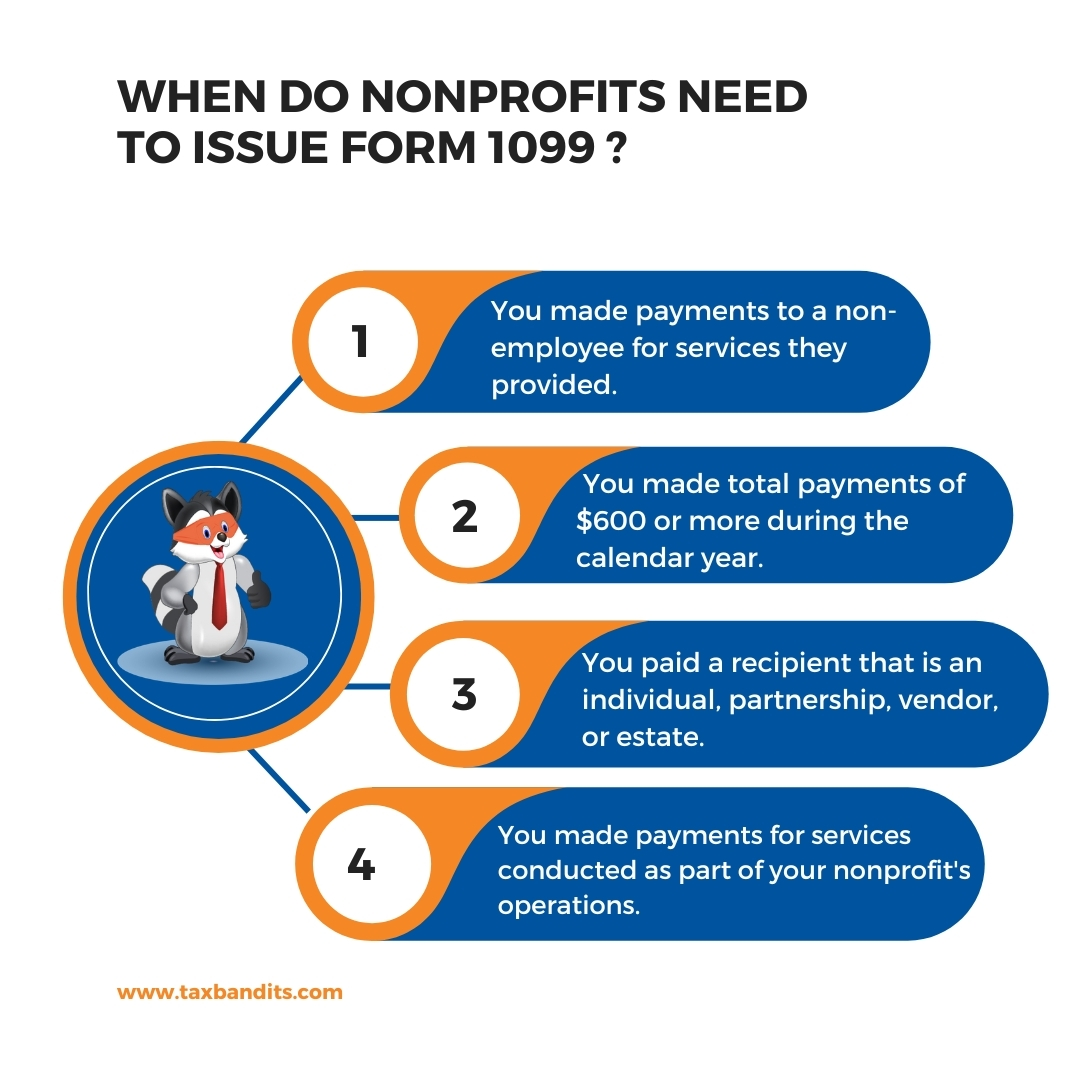Form 1099 for Nonprofit Organizations
Nonprofit organizations must comply with IRS regulations, including filing 1099 forms for payments made to independent contractors and non-employees. Despite their tax-exempt status, these filings ensure transparency and accountability in financial transactions.
This article covers the essential information needed to file 1099 forms effectively.
Table of Contents:
- What is a Nonprofit Organization ?
- What is a 1099 Form ?
- Which 1099 Forms do Nonprofits need to file with the IRS?
- When do Nonprofits need to Issue Form 1099?
- How does a Nonprofit issue a 1099 Form?
- What information is required to file a 1099 Form for Nonprofit Organizations?
- When is Form 1099 due for Nonprofit Organizations?
- What are the penalties for failing to file Form 1099?
- What best practices should nonprofits follow when filing a 1099 form?
- Do Nonprofits receive a 1099 Form ?
- Easy and Secure 1099 E-filing for Nonprofit Organizations
What is a Nonprofit Organization?
Nonprofit organizations are not just established to support charitable or socially beneficial causes; they are beacons of hope and change in society. These organizations can focus on various areas such as religion, science, charity, education, literature, health, or animal welfare.
In the U.S., nonprofit organizations are exempt from paying taxes. Donations to nonprofits are generally tax-deductible, and they do not have to pay taxes on contributions or other fundraising income.

Nonprofit organizations (NPOs) often rely on independent contractors to achieve their mission. Like volunteers and employees, contractors play a crucial role in supporting the nonprofit's goals. It is important to report payments to them to the IRS through 1099 forms.
What is a 1099 Form?
A 1099 form is an IRS tax form that reports non-employee compensation, interest, and dividends other than wages, salaries, and tips. It is commonly issued to:
- Independent contractors
- Freelancers
- Service Providers
Nonprofit organizations often hire contractors for work that does not require full-time employment. They must issue a Form 1099 to these contractors (payees), who will then report these non-employment payments on their tax returns.
Which 1099 forms do nonprofits need to file with the IRS?
Understanding the various types of Form 1099 for nonprofits is crucial, as each serves a different purpose. This knowledge will enable you to accurately report income and avoid potential penalties.
- 1099-MISC: This form reports miscellaneous income. It is commonly used when you pay a minimum amount of $600 during the calendar year for rent, medical and healthcare payments, attorney payments, and prizes.
- 1099-NEC: This form specifically reports nonemployee compensation. It is used to report payments of $600 or more made to freelancers or independent contractors.

Example: If you pay an independent contractor $800 for graphic design services, you must issue a 1099-NEC form to report this payment. The contractor must include this income in their annual tax return.
Depending on the nature of the payments, you may need to file other types of 1099 forms in addition to the 1099-NEC
and 1099-MISC.
When do Nonprofits need to issue Form 1099?
You will be required to issue a Form 1099 under various circumstances, which include:

How does a Nonprofit issue a 1099 Form?
Nonprofit organizations must accurately record all payments made to contractors throughout the year to issue Form 1099. Carefully track all payments to independent contractors to ensure the forms are filled out correctly. Before completing any 1099s, ensure you have all the necessary information and remind contractors to provide a W-9 Form.

Pro Tip: Request W-9 Forms from independent contractors during your nonprofit's onboarding process. This ensures you have the necessary information to issue Form 1099 at tax time, reducing potential complications.
What information is required to file a 1099 Form for Nonprofit Organizations?
When filing your 1099 for Nonprofit Organizations, gather the following information from the W-9 forms provided by
your contractors:
- Individual or business’s name or address
- Individual or business’s business structure(whether it is a corporation, LLC, or sole proprietor)
- Social Security Number (SSN)-applicable for individuals and sole proprietorships
- Taxpayer Identification Number(TIN)-applicable for business entities
- An account number
- Type of income reported
- Amount of income received
- Other details as listed in the 1099 Forms.
Form 1099 is used for various types of income, including non-employee compensation and miscellaneous income. It's crucial to use the correct form for each type of income reported. Double-check all information for accuracy before submitting the form.

Note: If you do not obtain a Social Security Number (SSN) or Employer Identification Number (EIN) by request W-9, the IRS requires you to withhold 24% of the payment as backup withholding. This means you must withhold income tax from the payment made to your contractor.
When is Form 1099 due for Nonprofit Organizations?
Nonprofits must be aware of the critical deadlines associated with 1099 forms. These are the most notable:
| Form Name | E-filing | Recipient Copy | Paper filing |
|---|---|---|---|
| 1099-NEC | January 31 | January 31 | January 31 |
| 1099-MISC | March 31 | January 31 | February 28 |
- March 31: This is the deadline to file 1099 forms electronically with the IRS. This deadline applies specifically to Forms 1099-MISC, 1099-R, 1099-INT, 1099-DIV, 1099-B, and 1099-S.
It is important to note that electronic filing for 1099 Forms is mandatory if you are filing 10 or more returns.
What are the penalties for failing to file Form 1099?
The IRS may impose penalties if you fail to submit the 1099 Form to the IRS by the required deadlines. These penalties can vary based on the size of your nonprofit organization and how late the forms were filed.
- A penalty of $60 if you file within 30 days from the due date.
- A penalty of $130 if you take over 30 days from the due date but file before August 1st.
- A penalty of $330 if you file after August 1st.
- A penalty of $660 if you fail to file intentionally.
The key to avoiding IRS penalties is to file on time with accurate information. Learn more about 1099 penalties.
What best practices should nonprofits follow when filing 1099 forms?
It’s important to follow the best practices when you file 1099s to ensure that everything is filed on time and correctly. Here are some tips to keep in mind:
- Verify that the contractor has provided accurate tax identification information.
- Keep accurate records of all payments made to contractors. Organize invoices, receipts, and documents in a physical or digital filing system.
- Review your list of contractors to determine who qualifies for a Form 1099.
- To avoid IRS penalties, contractors must receive their 1099 forms (Copy B) on time. To streamline the process, request their email addresses so that you can efficiently file and send the forms electronically.
- File your Form 1099 (Copy A) with the IRS, ensuring that all required information is accurately included.
- Complete and file Form 1096, which summarizes all the 1099 forms you sent each year.
Do Nonprofits receive a 1099 Form?
Nonprofits may receive a Form 1099, which indicates that payments made to them have been reported to the IRS by the payer for services provided. Like other businesses or individuals, nonprofits must report income that meets IRS criteria. Receiving 1099 forms ensures accurate income reporting and compliance with IRS tax regulations.
Easy and Secure 1099 E-filing for Nonprofit Organizations
Filing 1099 forms with TaxBandits is simple. You can easily choose the necessary forms, enter the required information, and submit them to the IRS and state.
TaxBandits offers e-filing solutions for Forms 1099-NEC, 1099-MISC, 1099-K, and more. Our solutions cater to the needs of tax professionals and businesses of all sizes. TaxBandits provides various features such as bulk filing, importing data from various accounting software platforms, and delivering recipient copies via postal mail or secure online access.
To file 1099 forms with TaxBandits, you’ll follow these simple steps:
- Step 1 : Create your free account and select the 1099 form.
- Step 2 : Enter the necessary 1099 form information.
- Step 3 : Review the 1099 and make any necessary edits.
- Step 4 : Pay the filing fee and transmit the 1099 Form to the IRS and State.
Simplify your 1099 reporting and stay tax-compliant with TaxBandits today!
Share this article
Related Topics

Success Starts with TaxBandits
An IRS Authorized E-file provider you can trust